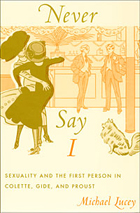
One of the most important writers of the twentieth century, André Gide also led what was probably one of the most interesting lives our century has seen. Gide knew and corresponded with many of the major literary figures of his day, from Mallarmé to Oscar Wilde. Though a Communist, his critical account of Soviet Russia in Return from the USSR earned him the enmity of the Left. A lifelong advocate of moral and political freedom and justice, he was a proscribed writer on the Vatican’s infamous “Index.” Self-published most of his life, he won the Nobel Prize for Literature in 1947, at the age of 77. An avowed homosexual, he nonetheless married his cousin, and though their marriage was unconsummated, at 53 he fathered a daughter for a friend.
Alan Sheridan’s book is a literary biography of Gide, an intimate portrait of the reluctantly public man, whose work was deeply and inextricably entangled with his life. Gide’s life provides a unique perspective on our century, an idea of what it was like for one person to live through unprecedented technological change, economic growth and collapse, the rise of socialism and fascism, two world wars, a new concern for the colonial peoples and for women, and the astonishing hold of Rome and Moscow over intellectuals. Following Gide from his first forays among the Symbolists through his sexual and political awakenings to his worldwide fame as a writer, sage, and commentator on his age, Sheridan richly conveys the drama of a remarkable life; the depth, breadth, and vitality of an incomparable oeuvre; and the spirit of a time that both so aptly expressed.

Considering novels along with journalism, theatrical performances, correspondences, and face-to-face encounters, Lucey focuses on the interlocking social and formal dimensions of using the first person. He argues for understanding the first person not just as a grammatical category but also as a collectively produced social artifact, demonstrating that Proust’s, Gide’s, and Colette’s use of the first person involved a social process of assuming the authority to speak about certain issues, or on behalf of certain people. Lucey reveals these three writers as both practitioners and theorists of the first person; he traces how, when they figured themselves or other first persons in certain statements regarding same-sex identity, they self-consciously called attention to the creative effort involved in doing so.
READERS
Browse our collection.
PUBLISHERS
See BiblioVault's publisher services.
STUDENT SERVICES
Files for college accessibility offices.
UChicago Accessibility Resources
home | accessibility | search | about | contact us
BiblioVault ® 2001 - 2024
The University of Chicago Press









